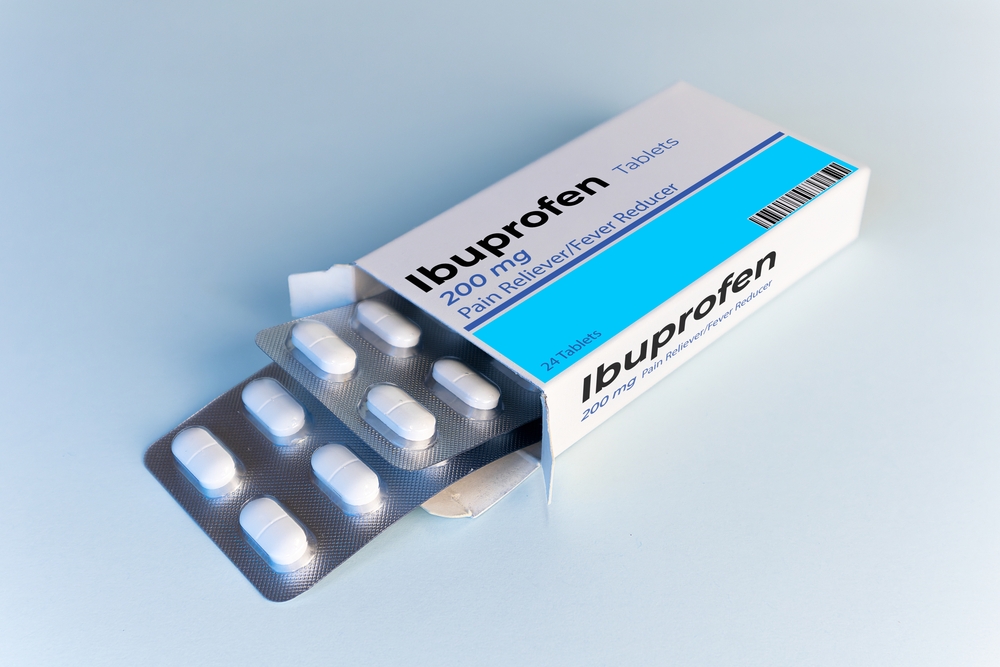Last Updated:
September 18th, 2025
In most people’s households, ibuprofen is readily available over the counter and widely trusted for light pain relief. Yet, many of us overlook the potential dangers when alcohol and ibuprofen mix in the body, resulting in unexpected and serious side effects.
This help guide outlines the risks of combining the two, examining short and long-term health impacts and some steps to take to reduce potential harm.
What is ibuprofen?
Ibuprofen is one of the most commonly used over-the-counter medicines in the world. It’s a painkiller that belongs to a class of drugs known as non-steroidal anti-inflammatory drugs (NSAIDs). It’s usually taken to relieve mild to moderate pain, reduce inflammation and lower fever symptoms. In the UK, common brand names include Brufen, Calprofen, Fenbid, Ibugel, and Ibuleve.
Ibuprofen works by blocking the production of prostaglandins, which are chemicals in the body that promote inflammation, pain and fever. By reducing prostaglandins, ibuprofen helps ease symptoms associated with a range of conditions, including headaches, muscle aches, arthritis, menstrual cramps and minor injuries.
Though it’s widely available without a prescription, ibuprofen use does not come without risks. When taken in high doses or combined with alcohol, the potential for harmful side effects significantly increases, especially in the stomach, liver and kidneys. Understanding how ibuprofen works is a key step in recognising why mixing it with alcohol can have serious consequences.
How do alcohol and ibuprofen interact in the body?
Ibuprofen and alcohol can both irritate the stomach and strain internal organs, especially if they’re taken together. While infrequent, low-dose mixtures may not present immediate dangers, combining the two does increase the risk of some complications.
Alcohol impairs liver function and can weaken the lining of your stomach, leading to a condition known as gastritis. One of the most immediate risks, then, is the way ibuprofen blocks cyclooxygenase (COX) enzymes, which can affect the protective barrier in the stomach. This combination raises the chance of stomach bleeding and ulcers, especially if either substance is taken frequently or in large amounts.
Over-the-counter painkillers are only intended for short-term use, and people with underlying conditions may be at greater risk of side effects when alcohol is consumed with ibuprofen.
What are the common side effects of mixing ibuprofen and alcohol?
Even in small amounts, there are common side effects when both alcohol and NSAIDs are in the body. The severity of side effects depends on how much of each substance is consumed and a person’s overall health. Some of the most common adverse effects include:
- Stomach discomforts: When taken together, ibuprofen and alcohol will both irritate the stomach lining, leading to indigestion, nausea and mild stomach pains. This happens when ibuprofen reduces prostaglandins while alcohol increases stomach acid production and weakens the gut lining.
- Increased blood pressure: For some people, ibuprofen can cause a rise in blood pressure and may also reduce the effectiveness of certain blood pressure medications. Alcohol has a similar short-term effect, which can be problematic for people with cardiovascular issues.
- Drowsiness, dizziness and fatigue: Both substances can cause mild sedation and impair reaction time in a user. When combined, the standard level of sedation is amplified, which can easily make everyday activities like driving or working with machinery more dangerous.
Are there more severe, long-term effects when mixing ibuprofen and alcohol?
In addition to the common, mild side effects of taking the two substances, there are greater and more severe risks with prolonged use.
- Deeper gastrointestinal issues: Continued irritation of the stomach lining from mixing the two substances can result in chronic digestive problems. Over time, this can lead to ulcers, gastrointestinal bleeding, or a reduced ability to absorb essential nutrients. Each of these complications can require medical intervention.
- Kidney and liver damage: Both the liver and kidneys are heavily involved in processing and filtering toxins. Alcohol strains both organs, and ibuprofen further inhibits essential cyclooxygenase (COX) enzyme pathways to support kidney function. Regularly taking both together will increase the risk of kidney disease and liver damage, which can further lead to alcoholic hepatitis or cirrhosis.
- Cardiovascular disease and strokes: NSAIDs like ibuprofen are associated with a higher risk of heart attacks and strokes, especially after long-term use. Alcohol also raises blood pressure and contributes to heart strain. When combined, the likelihood of serious or even fatal heart complications increases.
- Risk of addiction: Although research suggests that ibuprofen may not have strong addictive properties, it may have a higher potential for misuse in people with pre-existing alcohol use disorders. Habitual misuse and abuse as a way to self-medicate can pave the way for psychological dependence and behavioural patterns that are difficult to break.
Can you overdose on ibuprofen and alcohol?
While a small amount of ibuprofen and alcohol mixture is not considered extremely dangerous by the NHS, there is still the potential for an overdose if very large amounts are taken. One of the most prevalent causes for this can stem from how alcohol impairs judgement, leading a person to quickly lose track of what they’ve taken.
Warning signs of an ibuprofen overdose include:
- Severe abdominal pain
- Vomiting (especially if blood is present)
- Confusion or dizziness
- Difficulty breathing
- Convulsions or unresponsiveness
An overdose, in this case, does not always appear as an extreme, one-time event, but it can be the result of cumulative damage from sustained misuse. This is what makes early intervention for alcohol or substance addiction so important.
How long after taking ibuprofen can I drink alcohol?
If you’ve taken a standard dose of ibuprofen, it’s generally safe to drink alcohol after 10 to 12 hours once the drug has mostly left your system. This is based on ibuprofen’s half-life, around 2 hours, with complete elimination taking around 5 half-lives.
However, ibuprofen’s elimination from the body can still depend on a few individual factors, such as weight and dose size. If you’re inside, it’s best to consult a medical professional.
How to reduce the risk of negative outcomes after mixing
To reduce the risks involved when mixing ibuprofen and alcohol, it is, of course, best to completely avoid drinking until you know ibuprofen is completely out of your system. However, some other steps may help:
- Use the lowest effective dose and avoid long-term use without medical advice.
- Carefully check labels and instructions for over-the-counter NSAIDs.
- Speak to a doctor or pharmacist if you take ibuprofen regularly or drink often.
- Pay attention to warning signs (stomach pain, dizziness or nausea).
If you regularly use ibuprofen and drink alcohol, speak to your GP or pharmacist for advice. They can help you understand the risks specific to you.
Where can I get help for substance dependency?
Mixing alcohol with medication can be dangerous. If alcohol is affecting your life, now could be the time to seek support.
At Oasis Bradford, we understand how difficult it is to break free from substance misuse. Our expert medical team offers personalised treatment plans to help you detox safely and build lasting sobriety.
Whether you seek help for yourself or a loved one, we’re here. Take the first step towards a healthier, addiction-free life—contact us today.
(Click here to see works cited)
- Malik K, Dua A. Prostaglandins. [Updated 2022 Nov 21]. In: StatPearls [Internet]. Treasure Island (FL): StatPearls Publishing; 2025 Jan-. Available from: https://www.ncbi.nlm.nih.gov/books/NBK553155/
- “Is Alcohol Harming Your Stomach?” Drinkaware, www.drinkaware.co.uk/facts/health-effects-of-alcohol/general-health-effects/is-alcohol-harming-your-stomach
- “How Does Ibuprofen Work and Does It Ease Pain?” Nurofen, Nurofen, www.nurofen.co.uk/pain-advice/adult/does-nurofen-cause-stomach-problems
- Does Ibuprofen (Advil) Raise Blood Pressure? – Goodrx, www.goodrx.com/ibuprofen/ibuprofen-advil-raise-blood-pressure
- Fitzpatrick FA. Cyclooxygenase enzymes: regulation and function. Curr Pharm Des. 2004;10(6):577-88. doi: 10.2174/1381612043453144. PMID: 14965321.
- “Is Ibuprofen Addictive? Your Questions Answered.” Castle Craig, 10 Oct. 2023, www.castlecraig.co.uk/addiction-resources/is-ibuprofen-addictive/.
- DrugBank Online | Database for Drug and Drug Target Info, go.drugbank.com





